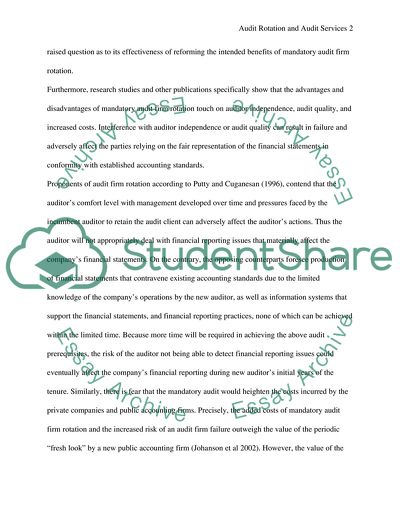Cite this document
(Compulsory Audit Firm Rotation Essay Example | Topics and Well Written Essays - 1913 words, n.d.)
Compulsory Audit Firm Rotation Essay Example | Topics and Well Written Essays - 1913 words. Retrieved from https://studentshare.org/finance-accounting/1581718-a-report-in-the-context-of-the-audit-of-public-companies-listed-on-the-london-stock-exchange-regarding-the-two-issues-that-the-committee-decided-against-implementing
Compulsory Audit Firm Rotation Essay Example | Topics and Well Written Essays - 1913 words. Retrieved from https://studentshare.org/finance-accounting/1581718-a-report-in-the-context-of-the-audit-of-public-companies-listed-on-the-london-stock-exchange-regarding-the-two-issues-that-the-committee-decided-against-implementing
(Compulsory Audit Firm Rotation Essay Example | Topics and Well Written Essays - 1913 Words)
Compulsory Audit Firm Rotation Essay Example | Topics and Well Written Essays - 1913 Words. https://studentshare.org/finance-accounting/1581718-a-report-in-the-context-of-the-audit-of-public-companies-listed-on-the-london-stock-exchange-regarding-the-two-issues-that-the-committee-decided-against-implementing.
Compulsory Audit Firm Rotation Essay Example | Topics and Well Written Essays - 1913 Words. https://studentshare.org/finance-accounting/1581718-a-report-in-the-context-of-the-audit-of-public-companies-listed-on-the-london-stock-exchange-regarding-the-two-issues-that-the-committee-decided-against-implementing.
“Compulsory Audit Firm Rotation Essay Example | Topics and Well Written Essays - 1913 Words”, n.d. https://studentshare.org/finance-accounting/1581718-a-report-in-the-context-of-the-audit-of-public-companies-listed-on-the-london-stock-exchange-regarding-the-two-issues-that-the-committee-decided-against-implementing.


